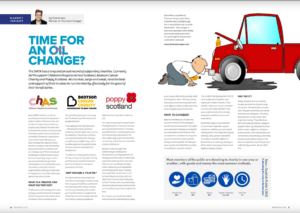We are delighted to work in partnership with the Scottish Motor Trade Association (SMTA), providing articles for their fantastic Auto Insight magazine.
In the 10th edition, Partner Fiona Haro, Head of Charities and Not-For-Profit, looks at the role that Trustees play in supporting local communities.
You’ll find the complete article on pages 20 & 21.
The SMTA has a long and proud record of supporting charities. Currently SMTA support Children’s Hospices Across Scotland, Beatson Cancer Charity and Poppy Scotland. All charities, large and small, need the help and support of their trustees to run the charity effectively for the good of their beneficiaries.
Many SMTA members, as well as providing services and employment opportunities in their local area, are involved in supporting community projects and charities. For some that will include becoming a charity trustee, volunteering their time and expertise to benefit a third sector organisation close to their heart.
Perhaps you have recently been approached to become a trustee or are considering getting involved in charitable work at a strategic level? There is no doubt that being a charity trustee is one of the most rewarding ways in which you can contribute to your local community or to a worthwhile cause. This article outlines the role and responsibilities of being a trustee and the key factors to consider before you agree to become a trustee.
WHAT IS A TRUSTEE AND WHAT DO THEY DO?
Trustees ensure the charity has a clear strategy, and that the work and goals of the charity are in line with its vision. A trustee’s role in a charity is to be the ‘guardians of purpose’, ensuring that all decisions put the needs of the beneficiaries first. They safeguard the charity’s assets – both physical assets, including property, and intangible ones, such as its reputation. They make sure these are used well and that the charity is run efficiently and effectively, with a business approach towards funding and resources for the benefit of its beneficiaries. Trustees don’t always get involved in the day-to-day running of the charity, but their close involvement ensures that the charity is run with good governance in mind.
WHY BECOME A TRUSTEE?
It is estimated that almost half of all charities are looking for trustees at any time, so you will be filling a vital role in the voluntary sector. Being a trustee can be very rewarding. As a trustee you have the chance to support and shape the work and strategic direction of a charity, making a significant difference to a cause that matters to you. You may choose to get involved with a charity focused on a cause or an issue you are passionate about or because your life has been touched by the work of that voluntary organisation. It is also a great way to get involved in the community or find out more about the not-for-profit sector. Being a trustee also offers the opportunity for professional development, gaining experience of strategy and leadership. It will provide experience of being a non-executive director, such as setting a strategic vision, influencing and negotiation, and managing risk. If you already have expertise in these areas, it can be rewarding to use those skills in a different and potentially challenging context. Trustees often say that being a charity trustee has been one the richest sources of learning in their professional lives. As a trustee, you are part of a team and will have the opportunity to apply your unique skills and knowledge while learning from others. Working closely with a passionate team of people who have different skillsets is often one of the most enjoyable aspects of the role.
WHAT TO CONSIDER?
Before committing to a trustee role, it is wise to research the charity you want to become involved in. You will be more invested in helping a charity that you have a personal interest in. Find out what time commitment is required of you to ensure that aligns with the time you have available. Perhaps you have a particular skillset that would be invaluable for a specific charity?
The Scottish Charity Regulator (OSCR) is the independent regulator and register for Scottish Charities. Their website – www.oscr.org.uk – provides access to all Scottish charities. Here you can find details of the charity’s operations and their income and expenditure.
Remember, anyone can volunteer to be a trustee, regardless of your experience, whether you are in paid employment or not, regardless of your ethnicity, class, gender orientation, sexuality or any other difference. Boards thrive on diversity and rely on this to deliver robust governance and fulfil the charity’s mission.
WHY DO IT?
Many of the partners at Thomson Cooper are charity trustees involved in a diverse range of activities. We talk to fellow trustees a lot. They are our friends, our clients and even our colleagues. One thing they all share is a passion for their respective charity. They talk about their work with great pride, happy to support others by using their business skills to make a difference. It helps to build networks and make friends and connections along the way. Ultimately, being a trustee helps to improve the lives and experiences of others for just a little bit of your time.

